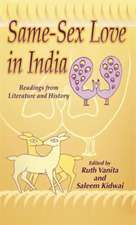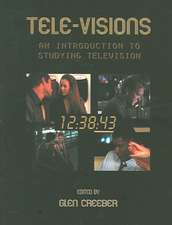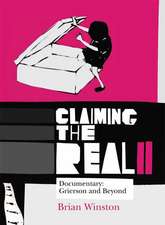Night Mail: BFI Film Classics
Autor Nanaen Limba Engleză Paperback – 17 sep 2007
Night Mail (1936) is one of the best-loved and best-known films in the canon of British documentary cinema. Bringing together the creative talents of Harry Watt, Basil Wright, W. H. Auden and Benjamin Britten, the film gave John Grierson's documentary school its first popular success. Its collectivist politics and its peculiarly modest brand of modernism is as redolent of the inter-war age as Agatha Christie, Penguin Books orThe Shell Guides. But it was also a corporate promo, part of a publicity campaign initiated by Clement Attlee to stave off Post Office part-privatisation and to improve the morale of postal workers.
Scott Anthony's study provides a lively appreciation of this vivid, witty and often just plain eccentric masterpiece. In doing so he uncovers the remarkable stories of civic-minded idealism, creative intrigue and political trickery that underpin this classic documentary.
Din seria BFI Film Classics
-
 Preț: 81.11 lei
Preț: 81.11 lei -
 Preț: 74.79 lei
Preț: 74.79 lei - 39%
 Preț: 60.76 lei
Preț: 60.76 lei - 39%
 Preț: 60.85 lei
Preț: 60.85 lei - 39%
 Preț: 61.30 lei
Preț: 61.30 lei - 39%
 Preț: 60.85 lei
Preț: 60.85 lei - 39%
 Preț: 60.85 lei
Preț: 60.85 lei - 39%
 Preț: 61.30 lei
Preț: 61.30 lei - 40%
 Preț: 60.42 lei
Preț: 60.42 lei - 40%
 Preț: 60.42 lei
Preț: 60.42 lei - 39%
 Preț: 61.29 lei
Preț: 61.29 lei - 39%
 Preț: 60.85 lei
Preț: 60.85 lei - 39%
 Preț: 60.85 lei
Preț: 60.85 lei - 39%
 Preț: 61.30 lei
Preț: 61.30 lei - 40%
 Preț: 60.42 lei
Preț: 60.42 lei - 40%
 Preț: 59.69 lei
Preț: 59.69 lei - 37%
 Preț: 64.42 lei
Preț: 64.42 lei - 39%
 Preț: 60.85 lei
Preț: 60.85 lei - 40%
 Preț: 59.62 lei
Preț: 59.62 lei - 40%
 Preț: 60.50 lei
Preț: 60.50 lei - 39%
 Preț: 60.85 lei
Preț: 60.85 lei - 39%
 Preț: 60.85 lei
Preț: 60.85 lei - 39%
 Preț: 60.85 lei
Preț: 60.85 lei -
 Preț: 121.34 lei
Preț: 121.34 lei - 39%
 Preț: 61.76 lei
Preț: 61.76 lei - 39%
 Preț: 60.85 lei
Preț: 60.85 lei - 39%
 Preț: 60.85 lei
Preț: 60.85 lei -
 Preț: 100.10 lei
Preț: 100.10 lei - 39%
 Preț: 60.85 lei
Preț: 60.85 lei - 39%
 Preț: 61.04 lei
Preț: 61.04 lei - 39%
 Preț: 60.76 lei
Preț: 60.76 lei - 39%
 Preț: 60.85 lei
Preț: 60.85 lei - 39%
 Preț: 61.23 lei
Preț: 61.23 lei - 39%
 Preț: 61.76 lei
Preț: 61.76 lei - 40%
 Preț: 59.62 lei
Preț: 59.62 lei - 39%
 Preț: 60.85 lei
Preț: 60.85 lei - 40%
 Preț: 60.42 lei
Preț: 60.42 lei - 40%
 Preț: 60.48 lei
Preț: 60.48 lei - 37%
 Preț: 64.42 lei
Preț: 64.42 lei - 39%
 Preț: 60.85 lei
Preț: 60.85 lei - 39%
 Preț: 61.57 lei
Preț: 61.57 lei - 39%
 Preț: 61.57 lei
Preț: 61.57 lei - 40%
 Preț: 60.42 lei
Preț: 60.42 lei - 39%
 Preț: 60.85 lei
Preț: 60.85 lei - 39%
 Preț: 60.95 lei
Preț: 60.95 lei - 39%
 Preț: 61.76 lei
Preț: 61.76 lei - 39%
 Preț: 60.85 lei
Preț: 60.85 lei - 40%
 Preț: 60.60 lei
Preț: 60.60 lei - 39%
 Preț: 61.76 lei
Preț: 61.76 lei
Preț: 60.76 lei
Nou
Puncte Express: 91
Preț estimativ în valută:
11.63€ • 12.09$ • 9.60£
11.63€ • 12.09$ • 9.60£
Carte disponibilă
Livrare economică 24 martie-07 aprilie
Preluare comenzi: 021 569.72.76
Specificații
ISBN-13: 9781844572298
ISBN-10: 1844572293
Pagini: 96
Ilustrații: colour illustrations
Dimensiuni: 135 x 190 x 7 mm
Greutate: 0.18 kg
Ediția:2007
Editura: British Film Institute
Colecția British Film Institute
Seria BFI Film Classics
Locul publicării:London, United Kingdom
ISBN-10: 1844572293
Pagini: 96
Ilustrații: colour illustrations
Dimensiuni: 135 x 190 x 7 mm
Greutate: 0.18 kg
Ediția:2007
Editura: British Film Institute
Colecția British Film Institute
Seria BFI Film Classics
Locul publicării:London, United Kingdom
Descriere
Night
Mail
(1936)
is
one
of
the
best-loved
films
in
the
canon
of
British
documentary
cinema. This
study
provides
a
lively
appreciation
of
this
vivid,
witty
and
often
just
plain
eccentric
masterpiece.
In
doing
so
he
uncovers
the
stories
of
civic-minded
idealism,
creative
intrigue
and
political
trickery
that
underpin
this
classic
film.
Notă biografică
SCOTT
ANTHONY
Textul de pe ultima copertă
Night Mail (1936) is one of the best-loved and best-known films in the canon of British documentary cinema. Bringing together the creative talents of Harry Watt, Basil Wright, W. H. Auden and Benjamin Britten, the film gave John Grierson's documentary school its first popular success. Its collectivist politics and its peculiarly modest brand of modernism is as redolent of the inter-war age as Agatha Christie, Penguin Books orThe Shell Guides. But it was also a corporate promo, part of a publicity campaign initiated by Clement Attlee to stave off Post Office part-privatisation and to improve the morale of postal workers.
Scott Anthony's study provides a lively appreciation of this vivid, witty and often just plain eccentric masterpiece. In doing so he uncovers the remarkable stories of civic-minded idealism, creative intrigue and political trickery that underpin this classic documentary.













